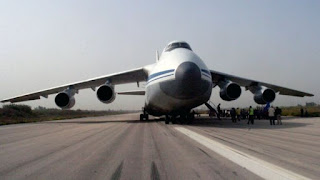US Ponders Putin’s Intentions in Syria
US Secretary of State John Kerry has called his Russian counterpart Sergei Lavrov in a bid to clarify the intent of Moscow's military build-up in Syria.
Mr Kerry warned that continued support for President Bashar al-Assad “risks exacerbating and extending the conflict," a statement said.
The US accuses Russia of boosting its military presence in Syria.
Russia - Mr Assad’s ally in the four-year civil war - says it is helping Syria fight Islamic State militants.
Moscow has increased its presence in the country just as the regime is losing ground to rebel groups.
Mr Kerry's phone call to the Russian foreign minister is believed to be his third in the past 10 days.
The state department statement said Mr Kerry warned that Russia's support for President Assad was "undermining our shared goal of fighting extremism if we do not also remain focused on finding a solution to the conflict in Syria via a genuine political transition".
"Secretary Kerry also reaffirmed the US commitment to fight ISIL (Islamic State) with a coalition of more than 60 countries, of which Assad could never be a credible member, and emphasised the US would welcome a constructive Russian role in counter-ISIL efforts."
White House spokesman Josh Earnest described Moscow’s support for President Assad as "a losing bet".
Satellite image allegedly showing construction at Latakia's airportImage copyrightStratfor
Image caption
This satellite image - taken on 4 September 2015 - allegedly shows construction at Latakia's airport
Analysis: Jonathan Marcus, BBC defence correspondent
Russia’s backing for Mr Assad should be seen not as a vote of confidence in Syria's embattled president but as an investment in a country where Russia believes it can play out its foreign-policy role.
Indeed Mr Putin's military deployments signal that he will not let the Assad regime fall. This does not mean Mr Assad will be there forever.
Russian diplomacy is working in tandem with its military policy, exploring all avenues for reaching some sort of interim deal in which Mr Assad might stay on, at least for the time being.
But Russia's horizons in Syria probably extend well beyond Mr Assad's active presence - a reflection of Russia's concerns about militant Islam and wider trends in the region, and also its belief that Western remedies in the Middle East have been an unmitigated disaster.
The Russian foreign ministry said that during the call Mr Lavrov again stressed “the need to form a united front" to fight terrorist groups in Syria.
Earlier, Russian President Vladimir Putin pledged continued military support for President Assad and urged other countries to join Russia in sending "military-technical assistance".
He said the flow of refugees to Europe would have been “even bigger" without Russian support for Syria's government.
President Putin said on Tuesday: "We support the government of Syria… in countering the terrorist aggression. We provide and will continue to provide it with the necessary military technical assistance. And we urge other countries to join us.”
A Pentagon spokesman said on Monday that a steady flow of people and equipment near the north-western city of Latakia suggested Moscow was planning to establish a “forward air operating base" at an airport there.
Last week, officials in Washington quoted by Reuters said Moscow had sent more aircraft and two tank landing ships to Russia's naval base in the Syrian coastal city of Tartus.
The war between President Assad’s regime and various rebel groups has so far killed at least 240,000 people and displaced millions.
This posting appeared today on
BBC
This posting appeared today on
BBC


Comments